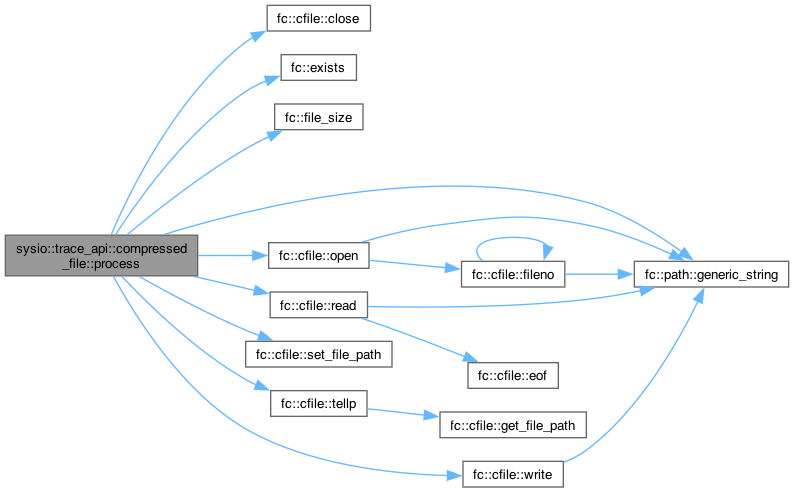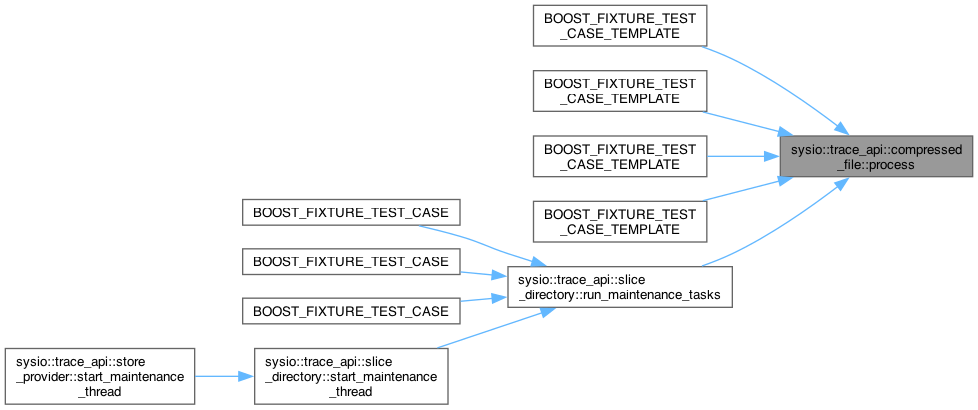#include <compressed_file.hpp>
Public Member Functions | |
| compressed_file (fc::path file_path) | |
| ~compressed_file () | |
| compressed_file (compressed_file &&) | |
| compressed_file & | operator= (compressed_file &&) |
| void | open () |
| bool | is_open () const |
| void | seek (long loc) |
| void | read (char *d, size_t n) |
| void | close () |
| auto | get_file_path () const |
| compressed_file_datastream | create_datastream () |
Static Public Member Functions | |
| static bool | process (const fc::path &input_path, const fc::path &output_path, size_t seek_point_stride) |
Detailed Description
wrapper for read-only access to a compressed file. compressed files support seeking and reading
the efficiency of seeking is lower than that of an uncompressed file as each seek translates to
- 2 seeks + 1 read to load and process the seek-point-mapping
- potentially a read/decompress/discard of the data between the seek point and the requested offset
More seek points can lower the average amount of data that must be read/decompressed/discarded in order to seek to any given offset. However, each seek point has some effect on the file size as it represents a flush of the compressor which can degrade compression performance.
A compressed file looks like this on the filesystem: /====================\ file offset 0 | | | Compressed Data | | with seek points | | | |-----------------—| file offset END - 2 - (16 * seek point count) | | | mapping of | | orig offset to | | seek pt offset | | | |-----------------—| file offset END - 2 | seek pt count | ====================/ file offset END
Where a "seek point" is a point in the compressed data stream where the decompressor can start reading from having not read any of the prior data seek points should be traversable by a decompressor so that reads which span seek points do not have to be aware of them
In zlib this is created by doing a complete flush of the stream
Definition at line 45 of file compressed_file.hpp.
Constructor & Destructor Documentation
◆ compressed_file() [1/2]
|
explicit |
Definition at line 171 of file compressed_file.cpp.

◆ ~compressed_file()
| sysio::trace_api::compressed_file::~compressed_file | ( | ) |
Definition at line 179 of file compressed_file.cpp.
◆ compressed_file() [2/2]
|
default |
Provide default move construction/assignment
Member Function Documentation
◆ close()
|
inline |
Close the underlying fc::cfile
Definition at line 96 of file compressed_file.hpp.
◆ create_datastream()
|
inline |
Definition at line 155 of file compressed_file.hpp.
◆ get_file_path()
|
inline |
return the file path associated with this compressed_file
- Returns
- the fc::path associated with this file
Definition at line 104 of file compressed_file.hpp.
◆ is_open()
|
inline |
Query whether the underlying file is open or not
- Returns
- true if the file is open
Definition at line 71 of file compressed_file.hpp.
◆ open()
|
inline |
Open the underlying fc::cfile for reading
Definition at line 60 of file compressed_file.hpp.
◆ operator=()
|
default |
◆ process()
|
static |
Convert the file that exists at input_path into a compressed_file written to output_path.
- Parameters
-
input_path - the path to the input file output_path - the path to write the output file to (overwriting an existing file at that path) seek_point_stride - the number of uncompressed bytes between seek points
- Returns
- true if successful, false if there was no error but the process could not complete
- Exceptions
-
std::ios_base::failure if the input_path does not exist or the output_path cannot be written to compressed_file_error if there is an issue during compression of the data stream
Definition at line 197 of file compressed_file.cpp.


◆ read()
| void sysio::trace_api::compressed_file::read | ( | char * | d, |
| size_t | n ) |
Read a given number of uncompressed bytes to the buffer pointed to by d.
This interface is made to match fc::cfile for easy integration
- Parameters
-
d - buffer to write data to n - the number of bytes to read
- Exceptions
-
std::ios_base::failure if this would result in reading past the end of the uncompressed file compressed_file_error if the compressed data stream is corrupt or unreadable
Definition at line 187 of file compressed_file.cpp.

◆ seek()
| void sysio::trace_api::compressed_file::seek | ( | long | loc | ) |
Seek to the given uncompressed offset
- Parameters
-
loc the byte offset in the uncompressed file to seek to
- Exceptions
-
std::ios_base::failure if this would seek past the end of the file compressed_file_error if the compressed data stream is corrupt or unreadable
Definition at line 182 of file compressed_file.cpp.
The documentation for this class was generated from the following files:
- plugins/trace_api_plugin/include/sysio/trace_api/compressed_file.hpp
- plugins/trace_api_plugin/compressed_file.cpp